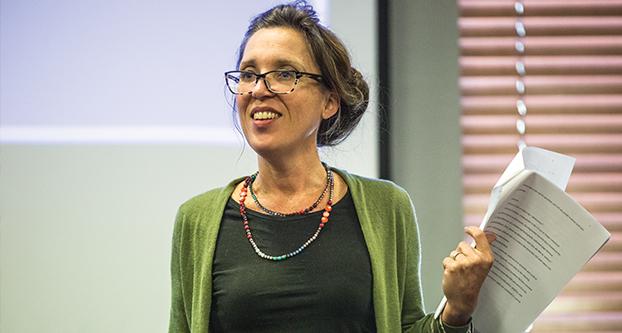The expansion of social media has posed growing problems, especially for female adolescents, says Dr. Aimee Rickman, an assistant professor in child and family sciences.
Rickman addressed the issue Wednesday in the University Student Union as a part of Women’s Herstory Month activities.
She presented her research on young women’s involvement in digital technology, the Internet and social media. The talk was titled, “I don’t want them knowing my business, and they don’t have to: An ethnographic study of female teens’ social media use within the U.S.” The title derives from a 17-year-old girl who was a part of Rickman’s research.
The girl told Rickman her parents misunderstood social media posts that her sister had put up. The title expresses the girl’s identity struggle with social media, family approval, along with cultural and social norms.
“I hope that students and members of the campus community come to think about young people’s involvement with social media as it relates to some of the struggles that young people face within U.S. society,” Rickman said. “What I hope people take from it is young women’s involvement in our society in a new way.”
Larissa Mercado-Lopez, assistant professor of women’s studies, introduced Rickman saying, “She is a critical interdisciplinary scholar of youth, technology, culture, marginality and gender.”
Rickman pointed out that adolescence is a socially produced reality, in which young people can be deprived of economic, political, civil and civic rights.
“Within the U.S., 95 percent of adolescents 12 to 29 use the Internet, and adolescents, as a whole, are the largest group of Internet users,” Rickman said.
She studied girls’ experiences in an attepmt to look past the stereotypes and understand from girls themselves and listen to their stories.
Her data comes from a sample of 15 females, ages 14 to 19, who live in rural areas in the Midwest. Only eight of them owned a smartphone, and three had no Internet at all.
Rickman explained adolescents living in these rural communities felt powerless and cut off because of their isolated geography. Her research shows that the suppression of expression with social media is one challenge young women face, she said.
She added that there is a stigma about female teens using social media due to the belief that girls are at risk or they are putting themselves in harm’s way.
“We wanted to use this event to highlight the expertise of our faculty on campus, who are doing this type of work on gender related to women’s history,” Mercado-Lopez said.
March is Women’s History Month and the Fresno State campus is hosting a diverse list of events all monthlong, a calendar of events is online at www.fresnostate.edu.




